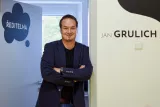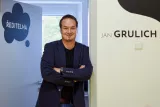Published: 10.05.2021
Both of his offices are stored in his laptop that he carries in his backpack. Jan Grulich, a graduate from the Faculty of Arts and Philosophy, a senator for the Rychnov constituency and the headmaster of a primary school in Dobřany, became a politician and won the Headmaster of the Year award in midst of the pandemic. He hopes to help to make education a priority in the Czech Republic.
You are a headmaster, teacher, shareholder in a company producing vitamin supplements as well as a senator for the Rychnov constituency. Anything I have omitted?
No, you got it right. After graduating from a teacher training programme, I became a teacher. To be able to keep a decent living standard of the family, which was difficult being a teacher, I tried to earn some extra money wherever I could. My father and I founded a small company. From time to time, I worked as a photographer and a translator to have some extra income. With time, I started enjoying teaching so much that I agreed to become a headmaster. I still run the family business, even though my wife and mother, and increasingly our children, are in charge of the day-to-day management.
You were elected senator for the Rychnov constituency in October. How do you manage to split your time between the responsibilities of a headmaster and a senator?
Neither the school nor the Senate work in the standard routine these days. So both my offices are stored in a laptop in my backpack, and both of the online worlds, in fact, overlap a lot. Sometimes I teach from my senator’s office and sometimes I join political discussions from my school office. In the evenings, I reply to all the e-mails and messages.
What made you enter the world of politics?
I would say that it was made by the circumstances to enter it. As a headmaster I found it difficult to accept that education was never a priority in the Czech Republic even though all parties said the opposite in the pre-election campaigns. So I tried to make calls from our rural school to let people know that something had gone wrong. However, I saw very soon that it had no repercussions.
So you decided to get involved.
I realized that in a parliamentary democracy system, which we have, we need to join the system and assume responsibility to able to inflict change. So I looked for a democratic party, joined it and tabled education-related topics... And I ended up in the Senate of the Czech Republic.
The area of your focus is education. What were the first issues that you started to address?
I would just like to make clear that the senator’s chair is really uncomfortable. After an hour, I have difficulties finding a way to sit (laughs). In addition to other senator’s duties, I started to bring up the topics that made me enter the world of politics. As soon as in December, I started to deal with the amendment of the Teachers Act. There were many meetings to attend, many expert reports to commission. I had many meetings with MPs and I tried to persuade them to define teachers’ salaries by law to avoid annual bargaining over the pay and to make the teachers comfortable.
Did you succeed?
In the end, I did. The Senate is considering the amendment at the moment.
Back in Pardubice, you studied at the Faculty of Arts and Philosophy. What are your memories of those years?
My years as a student were great and wild. In fact, I’m surprised that I managed to finish the school (laughs). I graduated from a BA programme of German Language Teaching. I had to do my MA programme in Prague since there was no suitable programme available in Pardubice back then.
Can you imagine yourself teaching at a secondary school or a university?
I guess I would have no difficulties teaching at a secondary school. But I have come to like the age group between 6 and 15 years. I would miss the interaction.
Your experience as teacher and a headmaster may be an asset in the Senate. Am I right?
My experience is crucial for the field that I would like to focus on. And I believe that rightly so. The Senate considers so many laws from a variety of fields that it is extremely important that senators come from various walks of life.
Education is facing a major threat during the COVID-19 outbreak. What will the pupils miss?
Pupils will miss things that Google won’t answer. What I mean to say that pupils will not miss some of the knowledge that they learn by heart. What they will miss, however, is Math, English, habits, fitness, skills acquired in PE, Music or Arts, as well as muscle memory. I think that we – as teachers – need to get ready for a very hard time once the pupils come back to school. The differences between the pupils will become even more prominent. Despite teachers’ efforts to make online teaching as good as possible, pupils will come back with very heterogeneous knowledge.
I would say that it was made by the circumstances to enter it. As a headmaster I found it difficult to accept that education was never a priority in the Czech Republic even though all parties said the opposite in the pre-election campaigns. So I tried to make calls from our rural school to let people know that something had gone wrong.
What are the biggest issues that are already evident?
Domestic violence, child depressions and addictions, mostly digital ones, are on the rise. Not to mention procrastination and loss of motivation to learn.
Is there anything positive that this situation may bring?
Ironically, the situation will show us that teachers are important. It will also make evident two problems faced by the new generation, namely lack of exercise and social contacts. It will expose both advantages and disadvantages of the digital world. It will reveal the widening gap in education given by the differences in the socioeconomic background of the families. It will show us what is worth teaching and what less so. It will spark discussions about the role of education and teachers, and draw our attention to the differences between schools not only in terms of equipment, but also in terms of the overall approach and readiness to learn new things. In spite of all the difficulties, the situation made teachers take a very hands-on training on using IT and new technologies. The Ministry of Education would have never achieved that in such a short time.
You are stressing the importance of education as well as the fact that nurses and doctors also received education. The management of the Faculty of Health Studies of the University of Pardubice tries to emphasize the importance of the role of healthcare professions. Not only doctors, but also other healthcare professionals need high-quality training. Does your interest span over all levels of education in the Czech Republic?
Absolutely. There is a lot inspiration available abroad. Many say that the Czech Republic faces a lack of physicians. In many countries, the systems count on specialized nurses who do not do only the paperwork, but also perform specialized procedures which need not be supervised by a doctor. Which saves the doctor’s time.
As for your second question, I am interested in all levels of education. In fact, I am also interested in education outside schools. I would like to stress that lifelong learning is extremely important in today’s turbulent times.
What is your idea of lifelong learning?
Maybe it is today’s situation that shows us its importance. We could make a better use of online sources, lectures, debates, modern platforms. But the overall approach is important. You should not hear your grandma say that e-mails and e-shops are not for her. In the same vein, we should not get too depressed over lack of work in our field but should try retraining instead. For example, my 90-year-old friend bought an iPhone and started to learn how to play the saxophone. If we keep learning new things all our life, we will undoubtedly stay mentally fresh until the very end of our lives.
You are a headmaster at the Trivium Primary School in Dobřany. When I checked your website and the teacher profiles, I thought: That is where learning through play takes place. Having said that, there are some rules in place at your school, right? What do you emphasize?
To keep children engaged. If we keep the children engaged and make them feel positive about learning and if we do not kill their curiosity, they will achieve much better results.
Can the principles of learning through play be applied to online teaching?
Unfortunately, we were not really prepared for online teaching, just like most schools. On the other hand, we were lucky to be a step ahead in terms of equipment. All teachers had IT equipment and most of them were proficient users. But teaching online is not only about being able to use a computer. We all had to learn how to go about it. I believe we are fast-adopters at our school, we make progress in our teaching and the services we deliver, but admittedly, just like many schools, we have reached a border that is hard to overcome. Many children have lost the will to learn, have lost their habits, concentration while learning online and the gap between hard-working pupils and the sloppy ones is paramount. It gets extremely demanding not only for the teachers, but also for the parents and the families. Therefore, there is a lot of tension and misunderstanding.
You like to be referred to as a rural headmaster, which connotes old times. The opposite is the case, though. You have built a modern school that is in high demand. In fact, you saved the school. Was the situation that bad?
It was, at that time. In 2005, there were 72 pupils enrolled in the school, it had run into debts and its reputation was far from being good. Not to mention the equipment and the facilities. And I am a rural headmaster indeed (laughs). I was born in a neighbouring village and attended the very same school.
Ironically, the situation will show us that teachers are important. It will also make evident two problems faced by the new generation, namely lack of exercise and social contacts. It will expose both advantages and disadvantages of the digital world.
You pay special attention to teacher recruitment. Some headmasters send a teacher directly from the job interview to the classroom, which may be difficult for the teacher. Do you also do it?
Good school is about good people. In other words, our teachers are the most precious and the most important asset. That is why the recruitment process is very thorough. Our teachers must undergo a very unorthodox recruitment process and they indeed have to do some teaching. But everything is agreed in advance and they know what they can expect. What surprises them is that they have to spend even the long break in the teacher’s room (laugh). But usually I warn them of this part of the recruitment procedure.
Pupils can play table tennis or table football in the corridors of your school, or they can play the drums. The teachers are fine with that?
They are, provided that the pupils are fine with learning during the lessons in exchange.
Mobile phones can be used during the lessons, but not during the breaks. How does that work?
Quite simply. Breaks are an important part of the teaching process. Children need breaks to relax, have a chat or a run, spend some time outdoors, play with a ball, engage in social interaction with others, play the drum or the piano, simply have some fun. And mobile phones made it difficult. That is why we introduced some rules and the children got used to them. They are told, mainly in the second grade, that mobiles are a good source of information or an excellent dictionary.
You studied German Language Teaching at the University of Pardubice. What is the attitude of today’s pupils to German?
Frankly speaking, I would not insist on having two foreign languages at a primary school. The second one should be optional. Some pupils struggle with Czech and we want them to master English. Learning German may become rather burdensome for them. If they could choose whether to have extra English or Math lessons, or learn German, then those who opt for German could master it in three years. Making everyone learn it is not really effective.
Every teacher has their own profile on the website of the school, including a photo. Everyone holds a motto. Who authored the mottos? The whole of the staffroom?
Everyone was free to choose a motto they liked and a motto that expressed something about their work. We had a good laugh when preparing the mottos. And censorship could not be avoided (laughs).
frankly speaking, I would not insist on having two foreign languages at a primary school. The second one should be optional. Some pupils struggle with Czech and we want them to master English. Learning German may become rather painful for them.
Your motto reads: Of course, Mr. Inspector. How frequent are the inspections at your school?
Since our region, the Orlické Mountains, is really lovely, I have a feeling that inspectors choose our school as a reward and they choose it often.
You subscribe to the legacy of Comenius to such an extent that his portrait is hung on the walls instead of that of the President. What should the pupils see at school? Comenius or politicians?
I would be really happy if I the portrait of Comenius could be accompanied by a portrait of a respectable president of the Czech Republic, who could be shown as an example of a wise, friendly and good-mannered person that makes good representation of our country. Let’s hope that it will be the case some time. But until it is the case, there will be only Comenius.
The school looks very modern even though it was built more than 250 years ago. Is that also thanks to you?
That is thanks to the construction company and the architect. But I was a demanding client and did not approve everything straightaway. I said what I thought.
Even though the history of the school is long, it is privately-run these days. Without any tuition fees being paid. How come?
The school itself is located next to the parish office in Dobřany where Czech revivalists (František Hek, Magdalena Rettigová and Josef Dobrovský) used to meet. Joined by Mr. Zeigler, the priest in Dobřany, they went through the writings of Comenius to revive Czech education even in mountain areas. The history of education in Dobřany goes back to 1680, i.e. many years before obligatory full-time education was introduced. In 1996, there was a risk that the school would be closed due to lack of pupils and funding. That was a wake-up call for the revivalists from the region. They founded a private school to save it.
Private schools receive some funding per pupil from the government. In other words, having sufficient pupils means having sufficient funding. We are also supported by the municipalities in the region and sponsors from among parents. Recently we have carried out a reconstruction and needed another 11 million Czech crowns. We raised the amount in one year only. More than two million came from parents and supporters of the school. I have always wished for the school to serve all children in the region. However, many families could not afford to pay tuition fees. So, I do my best to raise funds wherever possible
While last year was demanding, it was also successful for you. You were elected a senator and won the Headmaster of the Year 2019/2020 Award. What would you like to achieve this year?
What all of us want to achieve this year is survive in good health. I would wish very much to live a standard year. However, that seems to be a very ambitious and rather unreal wish. But I hope that it may come true next year. Let me wish all of us a lot energy and patience.
Mgr. Jan Grulich (1975)
Jan Grulich graduated from the Faculty of Arts and Philosophy (called the Institute of Languages and Humanities at that time) of the University of Pardubice. He studied a BA programme of German Language Teaching. Later he studied an MA programme in Human Resources and Andragogy at the University of Jan Amos Komenský in Prague. For one year, he studied in Basel, Switzerland. Since 1999, he has taught at the Trivium Plus Primary School in Dobřany. Currently he teaches mainly financial literacy and German. In 2005, he became the headmaster of the school. In October 2020, he was elected a senator for the Rychnov nad Kněžnou constituency (for TOP 09). He likes photography and music. He is married and has three children.



